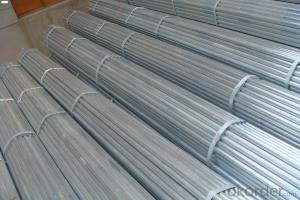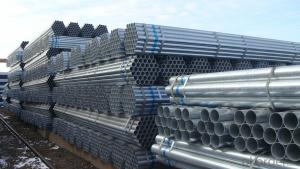Steel Pipe with High Quality and Best Price Q345
- Loading Port:
- Tianjin
- Payment Terms:
- TT or LC
- Min Order Qty:
- 25 m.t.
- Supply Capability:
- 50000 m.t./month
OKorder Service Pledge
OKorder Financial Service
You Might Also Like
1. Structure of Steel Pipe Q345 Descrption:
Having vast industrial knowledge of domain, we are offering a quality approved array of Stainless Steel Round Pipe. The Stainless Steel Round Pipe we offer is widely demanded amongst the clients for its sturdiness and reliability. These products are tested for their quality before being introduced in the market.
2. Main Features of the Steel Pipe Q345:
·Highly demanded
·Durable
·Reliable
·resist corrosion
·reasonable price
3. Steel Pipe Q345 Images:
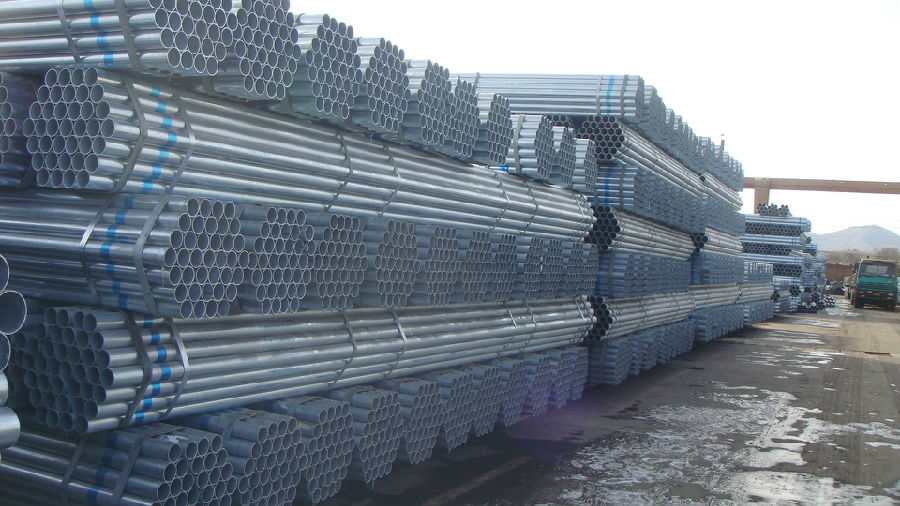
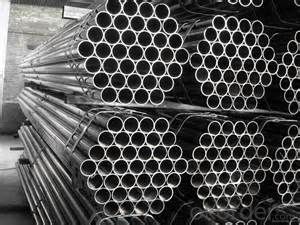
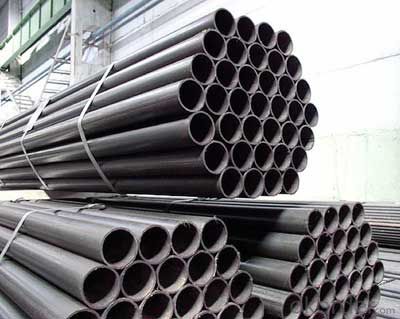
4. The Steel Pipe Q345 Specification:
Standard
JIS, DIN, ASTM
JIS G3445-2006, JIS G3444-2006, JIS G3446-2004, DIN EN 10216-1-2004, DIN EN 10217-1-2005, DIN EN 10305, ASTM A106-2006, ASTM A53-2007, ASTM A789-2001, ASTM A1020-2002, ASTM A179-1990, ASTM A199Grade
Cr-Mo alloy, Mo, ST35-ST52, Q195-Q345, CrNi alloy
15CrMo, 10CrMo910, 30CrMo, 15Mo3, 16Mo, St37, St52, St42, St45, Q235, Q345, Q195, Q215, Cr17Ni8, 1Cr13Mn9Ni1NThickness
2 - 50 mm
Section Shape
Round
Outer Diameter
10 - 900 mm
Secondary Or Not
Non-secondary
Application
Structure Pipe
Technique
EFW
Certification
API
Surface Treatment
Paint
Special Pipe
API Pipe
Alloy Or Not
Non-alloy
Specifications
1.W.T from 2mm to 70mm
2.OD from 10 to 1200mm
3.product by our own factory
4.on time dilivery
- Q:Who knows what is the difference between double submerged arc welded pipe and longitudinal submerged arc welding?
- Double submerged arc welding is also a kind of longitudinal submerged arc welding.
- Q:What is the fatigue strength of steel pipes?
- The ability of steel pipes to withstand repeated cyclic loading without failing is referred to as their fatigue strength. This characteristic is of utmost importance for pipes that experience dynamic or fluctuating loads, such as those used in the oil and gas industry, transportation infrastructure, or industrial applications. Several factors can affect the fatigue strength of steel pipes, including the grade of steel, dimensions of the pipe, manufacturing process, surface conditions, and environmental factors. Generally, steel pipes with higher tensile strength and toughness exhibit better resistance to fatigue. Fatigue strength is typically determined by subjecting the pipes to cyclic loading until failure occurs, through a process known as fatigue testing. The results of these tests are then used to establish a fatigue curve or S-N curve, which illustrates the relationship between the applied stress amplitude and the number of cycles required for failure. To quantify the fatigue strength, it is common to express it as the stress amplitude required to cause failure after a specific number of cycles, such as the stress amplitude at 10 million cycles (S-N10^7). However, it is important to consider other factors such as mean stress, surface finish, and loading frequency, which can also influence fatigue strength and may require consideration in specific applications. Ultimately, the fatigue strength of steel pipes is a crucial factor in engineering design and maintenance, as it ensures the long-term integrity and reliability of the pipes under cyclic loading conditions.
- Q:How are steel pipes used in the manufacturing of wastewater treatment systems?
- Steel pipes are used in the manufacturing of wastewater treatment systems for various purposes such as carrying and transporting wastewater, providing structural support to the system, and facilitating the flow of water and chemicals throughout the treatment process.
- Q:How are steel pipes classified based on their schedule?
- Steel pipes are classified based on their schedule, which refers to the thickness of the pipe wall. The schedule classification is denoted by a number, such as 10, 20, 40, 80, etc., with higher numbers indicating thicker walls.
- Q:How are steel pipes used in power plants?
- Steel pipes are extensively used in power plants for various applications. One of the primary uses of steel pipes in power plants is for transporting fluids and gases. These pipes are used to carry water, steam, and fuel (such as oil or gas) throughout the power plant. The high strength and durability of steel make it an ideal material for these pipes, as they can withstand high pressure and temperature conditions. Steel pipes are also used in power plant boilers. They form an integral part of the boiler system, where they carry hot gases and steam. These pipes are designed to withstand extreme heat and pressure, ensuring the safe and efficient operation of the boiler. Additionally, steel pipes are used in the cooling systems of power plants. Water is circulated through these pipes to cool down the equipment, such as turbines and condensers. The pipes are designed to withstand corrosion from the cooling water and maintain the required flow rate and pressure. Furthermore, steel pipes are used in the construction of power plant structures. They are used for the fabrication of support structures, such as frames, platforms, and walkways. Steel pipes provide excellent structural integrity and can withstand heavy loads, making them suitable for such applications. In summary, steel pipes play a vital role in power plants by transporting fluids and gases, serving as a part of the boiler system, facilitating cooling processes, and providing structural support. Their strength, durability, and resistance to extreme conditions make them an essential component in the operation of power plants.
- Q:How are steel pipes insulated for thermal efficiency?
- Steel pipes are insulated for thermal efficiency using various methods such as applying insulation materials like fiberglass, mineral wool, or foam to the surface of the pipes. This insulation helps to prevent heat loss or gain, thereby improving the energy efficiency of the pipes. Additionally, protective outer layers such as aluminum or PVC jackets are often added for extra insulation and to provide resistance against moisture and external elements.
- Q:How are steel pipes protected against external impact or mechanical damage?
- Steel pipes are typically protected against external impact or mechanical damage through the use of various methods such as applying protective coatings, installing corrosion-resistant materials, using concrete encasement, or utilizing protective shields or guards.
- Q:How are steel pipes used in the renewable energy sector?
- Steel pipes are widely used in the renewable energy sector for various applications. They are commonly used for the construction of wind turbine towers, providing structural support and stability. Steel pipes are also used in the construction of solar power plants, where they are utilized for the installation of solar panels, mounting structures, and support systems. Additionally, steel pipes are employed in geothermal energy projects, helping to extract and transfer hot water or steam from underground reservoirs. Overall, steel pipes play a crucial role in the renewable energy sector by facilitating the efficient generation and transmission of clean energy.
- Q:What is the difference between steel pipes and HDPE pipes?
- Steel pipes are made of steel, which is a sturdy and durable material. They are commonly used in industrial applications and can withstand high pressure and extreme temperatures. HDPE pipes, on the other hand, are made of high-density polyethylene, a type of plastic known for its flexibility and corrosion resistance. They are commonly used in water supply systems and underground applications. The main differences between steel pipes and HDPE pipes lie in their material composition, properties, and applications.
- Q:What are the different types of steel pipe coatings for corrosion protection?
- Some of the different types of steel pipe coatings for corrosion protection include epoxy coatings, polyethylene coatings, zinc coatings, and coal tar enamel coatings.
1. Manufacturer Overview |
|
|---|---|
| Location | |
| Year Established | |
| Annual Output Value | |
| Main Markets | |
| Company Certifications | |
2. Manufacturer Certificates |
|
|---|---|
| a) Certification Name | |
| Range | |
| Reference | |
| Validity Period | |
3. Manufacturer Capability |
|
|---|---|
| a)Trade Capacity | |
| Nearest Port | |
| Export Percentage | |
| No.of Employees in Trade Department | |
| Language Spoken: | |
| b)Factory Information | |
| Factory Size: | |
| No. of Production Lines | |
| Contract Manufacturing | |
| Product Price Range | |
Send your message to us
Steel Pipe with High Quality and Best Price Q345
- Loading Port:
- Tianjin
- Payment Terms:
- TT or LC
- Min Order Qty:
- 25 m.t.
- Supply Capability:
- 50000 m.t./month
OKorder Service Pledge
OKorder Financial Service
Similar products
New products
Hot products
Related keywords
